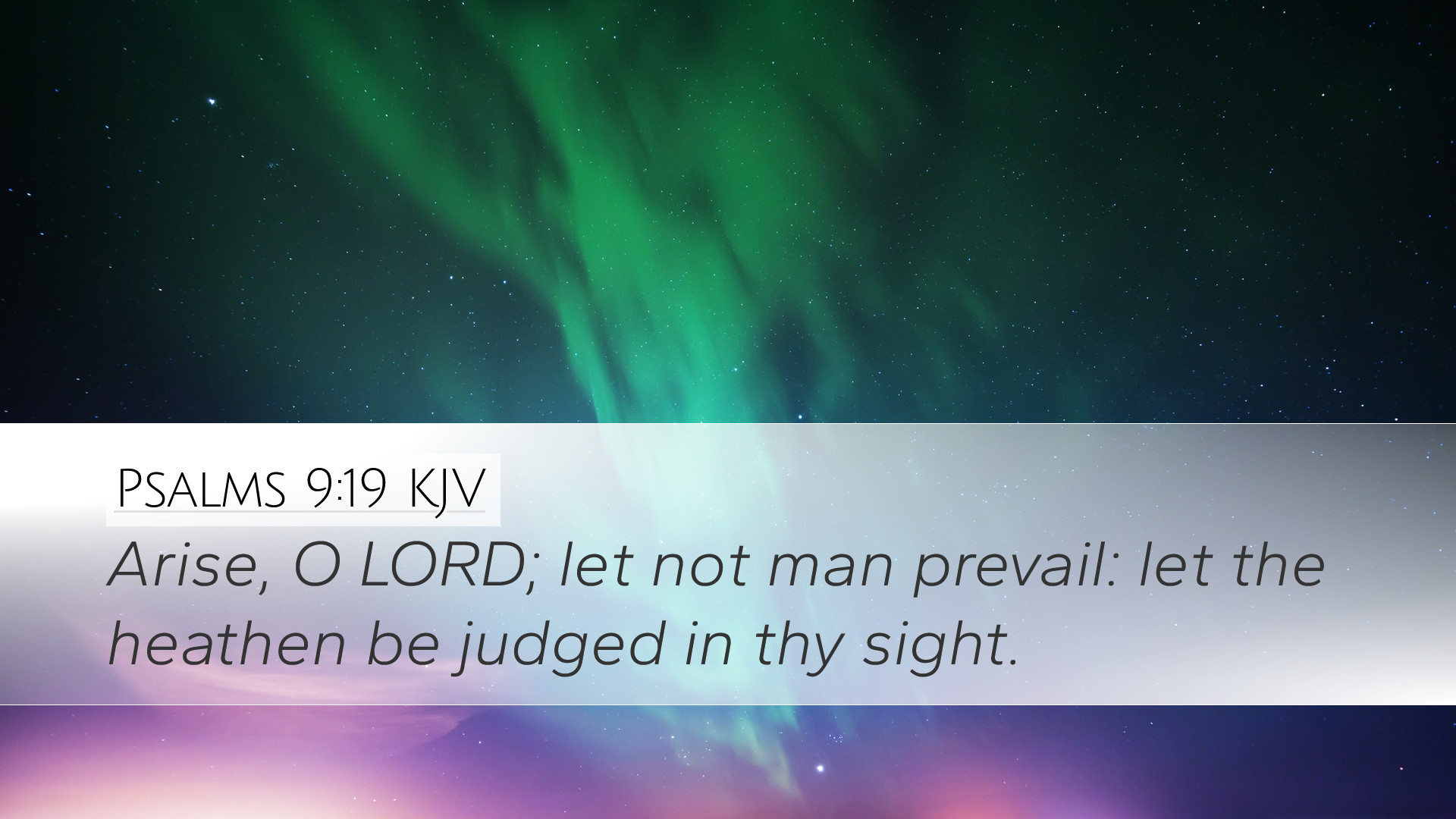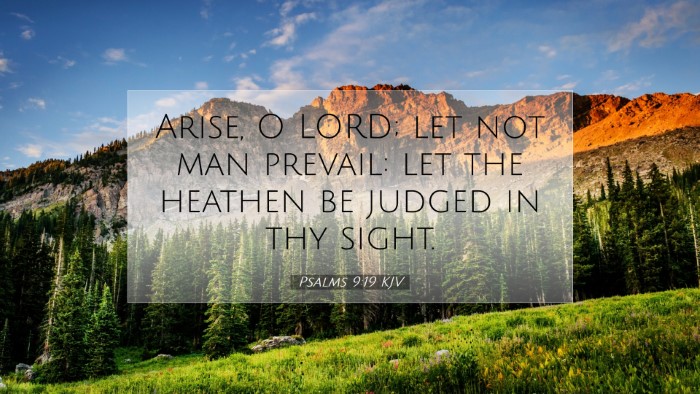Commentary on Psalms 9:19
Psalms 9:19 (KJV): "Arise, O Lord; let not man prevail: let the heathen be judged in thy sight."
Introduction
This verse from Psalm 9 is a poignant cry for divine intervention. It reflects the deep-seated desire of the psalmist for God to act decisively against those who oppose Him and His people. In the context of public domain commentaries, we will explore insights from Matthew Henry, Albert Barnes, and Adam Clarke, aiming to provide a comprehensive understanding of this verse's theological and practical significance.
Thematic Overview
- The Call for Divine Action: The opening plea, "Arise, O Lord," indicates a recognition of God’s sovereign role in history and His ultimate authority over worldly affairs.
- The Recognition of Human Limitations: The phrase "let not man prevail" speaks to the psalmist’s understanding of humanity's frailty and the futility of human strength against divine will.
- Judgment Against the Nations: The mention of judgment upon the heathen underscores the theme of divine justice—God is called upon to ensure that righteousness prevails.
Matthew Henry's Insights
Matthew Henry emphasizes the urgency of the psalmist's plea for God to arise in judgment. He notes that this verse portrays a struggle not only against individual foes but also against collective adversities faced by the people of God. Henry remarks on the psalmist's confidence in God’s ability to deliver and to judge fairly, highlighting that divine justice will eventually vanquish human opposition.
Moreover, Henry elaborates on the significance of waiting upon God. He believes that human efforts are ultimately inadequate to shift the balance in spiritual and moral conflicts. The call for God to "arise" symbolizes a desire for a visible and powerful action that only the Almighty can accomplish.
Albert Barnes' Perspective
Albert Barnes interprets the phrase "let not man prevail" as a recognition of man's propensity to transgress God's laws. He argues that the psalm indicates a situation in which mankind has overstepped divine boundaries and suggests the psalmist’s acknowledgment of this moral decay. Barnes encourages readers to understand the gravity of the term "the heathen," referring to those nations that oppose God.
Barnes goes further to discuss how the plea for God to judge the heathen reflects an assurance of God’s justice. He encourages believers to remain steadfast in faith, knowing that in God’s perfect timing, He will render judgment and that no human endeavor will thwart His righteous will.
Adam Clarke's Commentary
Adam Clarke provides a rich qualitative analysis of the text, emphasizing the prophetic nature of the psalm. He asserts that the petition "let the heathen be judged" is linked to the messianic hope found throughout Scripture. Clarke interprets the verse as prophetic of the discernment that comes with the establishment of God's kingdom on Earth, where righteousness and justice will hold sway over all nations.
Furthermore, Clarke addresses the eschatological implications of the verse, indicating that the plea for divine judgment encompasses both current events and future realities. He urges scholars and believers alike to view this psalm as a reminder of God's ultimate triumph over evil and the assurance that He reigns supremely throughout history.
Theological Implications
In examining Psalms 9:19, several theological themes arise:
- Divine Sovereignty: The psalmist’s appeal demonstrates a robust belief in God's control over earthly affairs. This verse can be a comfort to believers facing adversities, affirming that God is aware of and will act against injustice.
- Human Responsibility and Limitations: This verse encourages an understanding of human frailty; while human efforts are vital, they are insufficient without divine support and intervention.
- Justice and Righteousness: The call for judgment signifies the expectation of moral order in the world, urging believers to trust in God's character as the ultimate judge.
Practical Applications
For pastors, students, theologians, and scholars, the implications of Psalms 9:19 are numerous:
- Encouragement in Prayer: This verse acts as a model for prayer that intercedes for justice. Leaders might encourage congregations to pray earnestly for divine intervention in situations of injustice.
- Understanding Context: Biblical scholars can explore this verse within its historical and literary context, enhancing the interpretation of psalms in both personal and communal settings.
- Faith amidst Opposition: The verse inspires resilience, reminding believers that while opposition may arise, God’s power will ultimately prevail.
Conclusion
Psalms 9:19 serves as a powerful reminder of God’s sovereignty and the assurance of divine justice. Through the combined insights of Matthew Henry, Albert Barnes, and Adam Clarke, we glean a deeper understanding of the psalm's message. It calls on us to acknowledge our human limitations, to seek divine assistance in the face of adversaries, and to trust in God's ultimate judgment of the nations. In responding to this Scripture, believers are equipped to confront the challenges of their time while maintaining hope in God’s righteous plan for the world.


